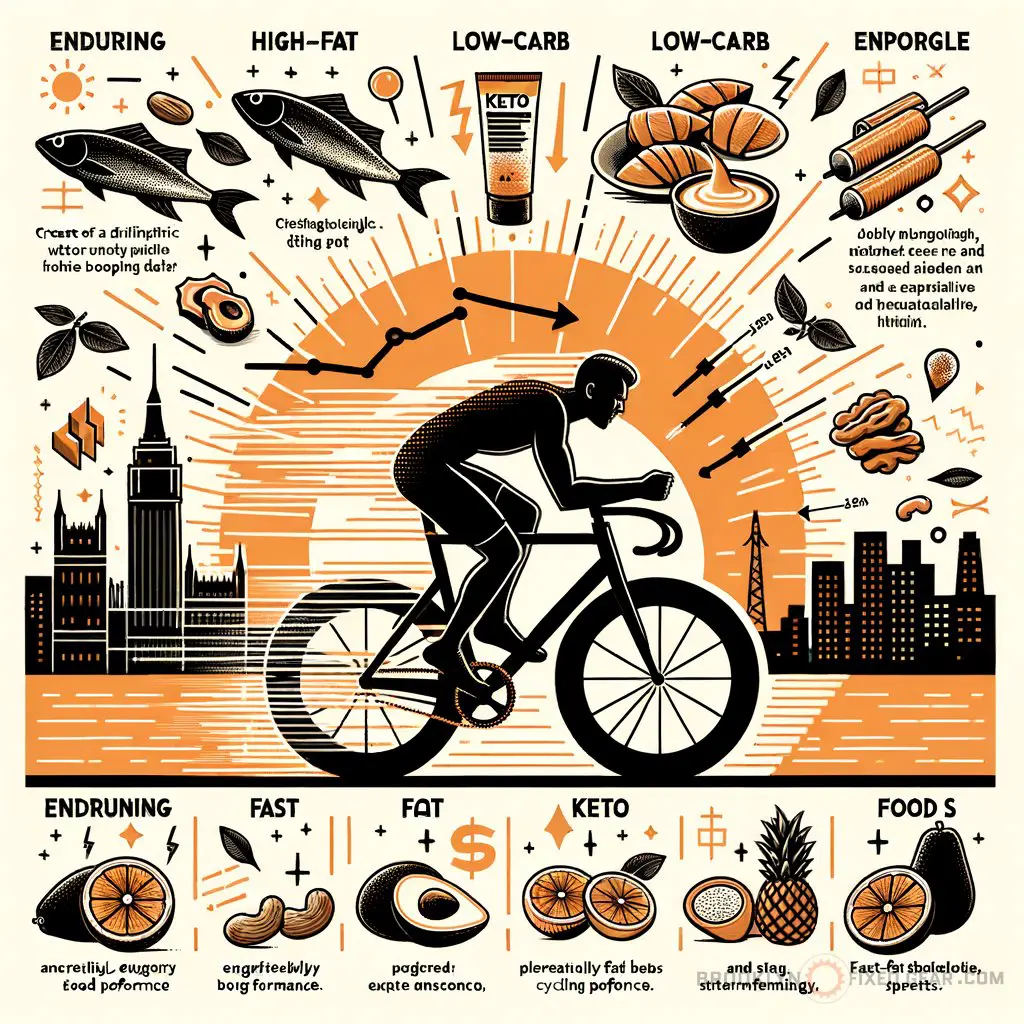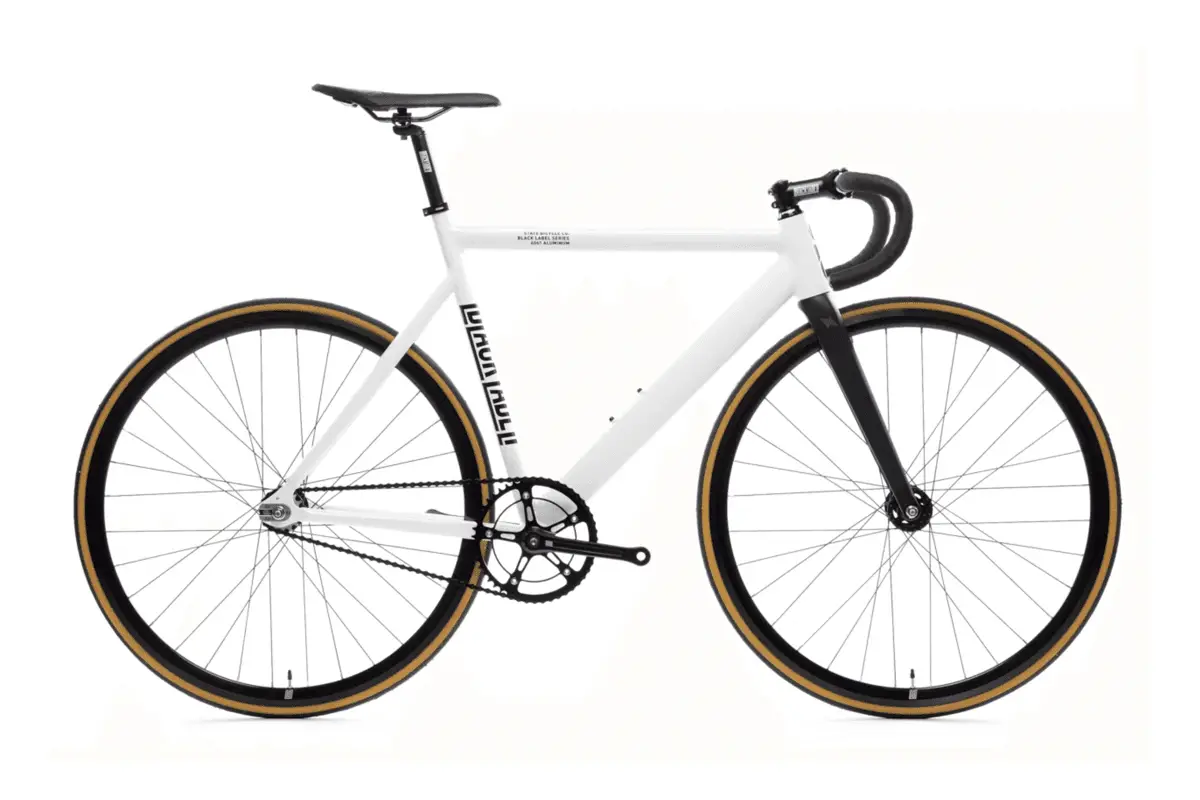Imagine cruising through the bustling streets of NYC, your heartbeat syncing with the rhythmic pedal strokes of your trusty fixie.You’ve dialed in every component, from the perfectly chosen fixie bike to the handlebars that just get your ride.But have you ever pondered how your diet impacts your pedal power?
Could a ketogenic diet turbocharge your cycling performance? Today we’ll explore just that, unraveling the ties between keto and your time on two wheels. Explore our selection of the best fixie bikes that might just become your new road companion.
Key takeaways
- Fat as fuel can provide consistent energy for cycling.
- Keto may boost endurance but not support sprints as well.
- Always hydrate and manage electrolytes carefully on keto.
How does keto influence your ride?
The ketogenic diet – a high-fat, low-carb eating plan – has been making waves in the fitness world. But as urban cyclists who thrive on high-intensity riding, it’s crucial to assess how this switch might impact our energy on the fixie. Let’s dissect the ketogenic diet and its potential effects on cycling performance.

1. Fueling up on fats
Shifting to a ketogenic diet means your body starts burning fat for fuel instead of carbs. This could mean a steadier energy source for those long rides. You won’t hit the same sugar highs and crashes, leading to a more consistent performance on the saddle.
Still, this doesn’t mean you can skimp on quality nutrition – grabbing that nutrition guide for urban cyclists is key to eating for energy on the road.
When it comes to choosing pre-ride meals, fatty fish, nuts, and avocados could become your new best buddies. Ditching sugar for these powerhouses can help maintain energy levels, but you’ll still need to keep an eye on how your body’s adjusting, especially if you’re tackling big hills or rigorous routes.
2. Endurance over sprints
Keto’s not just about what you eat; it’s how it affects your ride. This diet might boost your endurance, helping you churn out miles with eccentric cycling benefits without feeling like you’ve hit a wall. It’s about playing the long game, not just quick bursts that burn you out.

However, sprinters beware. The ketogenic diet may not cater well to those explosive, high-intensity moments. Studies suggest that while endurance athletes might see improvements in performance, those in need of quick glycogen access for sprints might find that keto puts them at a disadvantage.
3. The metabolic shift
Transitioning to keto requires a shift in metabolism, which can be a game-changer for how your body operates during a ride. You might find that you have an increased ability to burn fat during long, continuous rides, like when you’re transforming your fixie for touring adventures.
This metabolic adjustment takes time, and during the transition, you might feel a dip in performance – a phase familiarly known as the ‘keto flu.’ It’s a temporary setback that requires patience and possibly adjusting your cycling routine to match your body’s new method of energy production.
4. Weight management
For many riders, striking that ideal weight-to-power ratio is crucial, and keto could help in shedding a few extra pounds. A leaner physique could translate to a more comfortable ascent and a more aerodynamic form when you’re tucked into the drop bars, chasing the wind.
Remember, though, weight loss isn’t an overnight adventure, even on keto. You may still need to pair the diet with regular rides and workouts – always a good excuse to put in more miles or venture into HIIT vs. endurance for cycling sessions to find out which type suits your new diet and weight objectives better.

5. Reduced carb reliance
Let’s face it, on a long city ride, you don’t want to haul a bunch of high-carb snacks. Keto can reduce your reliance on these quick fixes by adjusting your body to rely more on its fat stores. It’s all about makin’ the miles without constantly reaching for an energy gel or bar.
Nonetheless, during intense workouts or races, you may still need to listen to your body’s signals. If you’re hitting it hard, a strategic carb feed within your ride could be necessary to maintain performance – understanding the balance is key.
6. Hydration and electrolyte balance
With fewer carbs comes less water retention, which means you gotta stay sharp with your water bottle. Keto pushes your body to flush out water and electrolytes quicker, so you’ll need to be on top of hydration to prevent cramps and keep your legs spinning.
Ensuring a proper balance of sodium, magnesium, and potassium can help keep everything running smoothly. It might be worth looking into electrolyte supplements or tweaking your diet to ensure you’re getting enough minerals to support your rides, particularly in those longer, grittier outings that push you to your limits.
State Bicycle Co. Black Label 6061

State Bicycle Co. Black Label 6061
More cycling performance tips
When embarking on a ketogenic diet, there are several other strategies to bear in mind to keep your performance on point. Let’s take a look at some more tools in your kit that could really make a difference.
- Hydrate smartly to counterbalance the diuretic effect of a low-carb diet. Keep a water bottle handy on all rides.
- Gradually reduce carb intake to ease into ketosis without shocking your system.
- Monitor blood ketone levels to ensure you’re maintaining ketosis for optimal performance.
- Tweak your training routine; initially, opt for low-intensity rides as your body adjusts to the new fuel source.
- Consider a targeted ketogenic diet (TKD); adding a small carb intake around workouts for an energy boost.
- Keep a log of your dietary intake and track how your body responds to training to fine-tune your approach.
Dos and don’ts of combining a ketogenic diet with cycling
Before diving deep into the keto lifestyle and its integration with your fixed-gear passion, let’s weigh some essential dos and don’ts to steer your journey:
| Do | Don’t |
|---|---|
| Consult with a nutritionist | Rush into a drastic dietary change |
| Monitor your energy levels | Ignore signs of fatigue or low energy |
| Adjust electrolyte intake | Neglect hydration and mineral balance |
| Consider a cyclical keto diet | Be inflexible with your dietary approach |
| Listen to your body | Disregard the importance of recovery |
“Shifting to a ketogenic diet means your body starts burning fat for fuel instead of carbs. This could mean a steadier energy source for those long rides. You won’t hit the same sugar highs and crashes, leading to a more consistent performance on the saddle.”
Advantages and disadvantages of the ketogenic diet in cycling
Adding a ketogenic diet into your cycling routine can be a real game-changer, offering benefits that align with long-distance riding and weight management. However, it’s not all tailwinds and smooth roads; there are some bumps along the way to consider.
Advantages
- Sustained energy levels without frequent carb-loading
- Can aid in weight loss, improving power-to-weight ratio
- May enhance fat oxidation, beneficial for long rides
- Reduced need to carry or consume as many snacks during rides
- Potential for improved blood sugar regulation
Disadvantages
- Potential initial decrease in performance during the adaptation period
- Might not support high-intensity efforts or sprinting as effectively
- Electrolyte imbalance can be a risk if not managed properly
- Reduced muscle glycogen stores could affect explosive power
- Requires strict adherence and monitoring to maintain ketosis
In my opinion, if you’re a serious cyclist dedicated to the fixie life and looking to level up your endurance rides through NYC or any other urban jungle, the keto diet could be a curveball worth considering. From what I’ve seen and read, it appears to offer a steady stream of energy that could help in avoiding the dreaded bonk on those epic city loops.
However, it’s essential to acknowledge that every cyclist’s body is different and will respond uniquely to dietary changes. Keto might do wonders for some but could be a no-go for others. For anyone considering making the switch, I suggest giving it some thorough thought and maybe even exploring how diet influences cycling performance with some expert insights before grinding gears into the keto lifestyle.
If you are a visual learner, check out this video titled ‘WHAT IS KETO CYCLING? — DR. ERIC WESTMAN’
Frequently asked questions (FAQ)
Will I lose muscle mass on a ketogenic diet as a cyclist?
Not necessarily. While a ketogenic diet restricts carbs, which are crucial for muscle recovery and growth, consuming enough calories and protein is essential to prevent muscle loss. A well-planned keto diet should include adequate protein intake to maintain muscle mass, especially important for cyclists who rely on strong leg muscles.
How long does it take to see performance benefits from the ketogenic diet?
The adaptation phase varies for each cyclist, but it generally takes a few weeks to a couple of months for your body to fully adapt to using fat for fuel. During this period, some performance drop-off is common, but once adapted, many cyclists report a significant improvement in their endurance and a more stable energy level throughout their rides.
Can I do high-intensity interval training (HIIT) while on a keto diet?
High-intensity interval training can be more challenging on a ketogenic diet since it typically relies on quick access to glycogen stores. However, some cyclists on keto adapt by consuming a small amount of fast-acting carbs before intense sessions to support their performance. This strategy, known as the targeted ketogenic diet, can help provide the necessary energy for high-intensity workouts.
Final thoughts
Alright, pedal pushers, that’s the lowdown on the ketogenic diet and cycling performance. It’s a journey worth exploring for some, especially those fixie aficionados looking to conquer the urban sprawl with relentless endurance. Just remember, nutrition is as personal as your choice of bar tape – what works for one cyclist may not for another.
So if you’re keen to make any big changes, it’s wise to do so with care and perhaps a chat with a nutrition expert.
How has your diet affected your rides? Did I cover everything you wanted to know? Let me know in the comments section below. I read and reply to every comment. If you found this article helpful, share it with a friend, and check out my full blog for more tips and tricks on enhancing cycling performance.
Thanks for reading, and here’s to your next seamless glide through the concrete canyons of the city.















